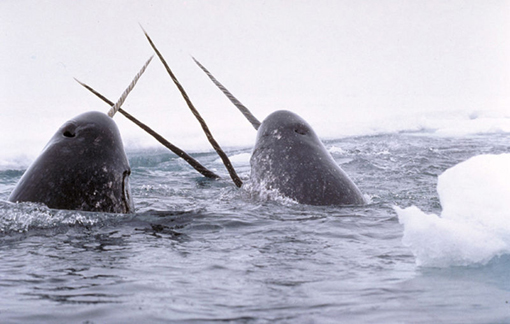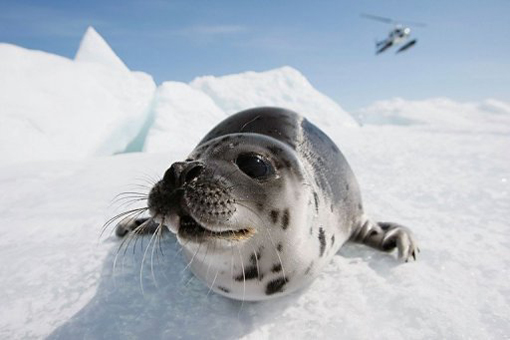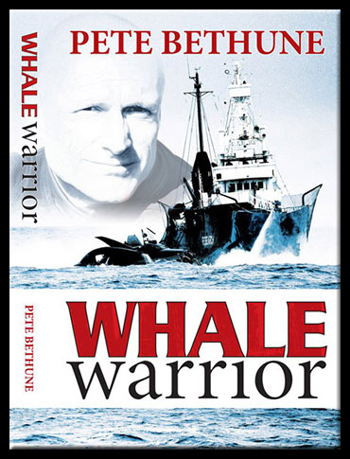You are hereBlogs / WcP.Story.Teller's blog / We'll be judged tomorrow by what we do today. Unicorn whales help humans..humans hunt whales & seals. Planet needs more Eco hero
We'll be judged tomorrow by what we do today. Unicorn whales help humans..humans hunt whales & seals. Planet needs more Eco hero



(quote)
Warmer Arctic spells colder winters. 'Unicorn' whales do scientists favor by taking Arctic temp
It's no secret that the proverbial canary in the climate change mine is the Arctic. As National Oceanic and Atmospheric Administration (NOAA) administrator Jane Lubchenco noted when her organization launched its annual Arctic Report Card last week,“To quote one of my NOAA colleagues, ‘whatever is going to happen in the rest of the world happens first, and to the greatest extent, in the Arctic.’”
But, even as the Arctic warms, seemingly irrevocably, it is still a formidable environment in which to operate, particularly in the winter. The coasts of Greenland, in particular, act as pathways for ice from the Arctic Ocean, as a result of which winter research expeditions can require icebreaking vessels that cost millions of dollars to charter.
Consequently, in some areas, such as Baffin Bay, a large area between northeast Canada and southwest Greenland, winter data have been scarce -- or, in the words of Mike Steele of the University of Washington, "there was this gigantic, embarrassing hole."
Narwhal_satellite That hole is now being filled - thanks to narwhals, medium-size whales, endemic to the Arctic, known as unicorns of the seas because of the single, spiralling tusk found in males.
In a paper just published in the Journal of Geophysical Research -Oceans, Steele and other researchers, led by Kristin Laidre, also of the University of Washington, described tagging narwhals with satellite sensors that recorded ocean depths and temperatures during feeding dives from the surface pack ice to the seafloor, as deep as 1,773 meters, or more than a mile.
In total, 14 adult narwhals were tagged with sensors. The data were automatically sent to a satellite when the narwhals surfaced for air between cracks in the sea ice. Tagging was carried out in accordance with the University of Washington’s Animal Care Guidelines and a permit issued by the Government of Greenland. Each sensor tag provided up to seven months of data before falling off.
Previously, winter temperature estimates in Baffin Bay were based on climatology data gathered from small settlements on both coasts. That data provided an estimated average winter temperature in southern Baffin Bay of about 3.3 degrees C (37.9 F). Data from the narwhals, however, showed that the temperatures in the bay were in fact warmer -- between 4 and 4.6 degrees C (39.2 - 40.3 degrees F).
“Narwhals proved to be highly efficient and cost-effective ‘biological oceanographers,’ providing wintertime data to fill gaps in our understanding of this important ocean area,” said Laidre. "It's always nice to fill in a gap," added Steele, who said that the new data, and data collected from possible future narwhal-centric missions, may help make future climate models of the region more accurate.
Japan to kill more than 900 minke whales, 50 fin whales and 50 humpback whales in the Southern Ocean this season
A mock whale slaughter in Sydney Harbour will serve as a macabre protest against the start of the Japanese hunting season in the Southern Ocean. The International Fund for Animal Welfare (IFAW) is staging it at Darling Harbour on the eve of World Anti-Whaling Day, to highlight the annual hunt in a sanctuary that covers 50 million square kilometres around Antarctica.
IFAW whale program director Patrick Ramage said the arrival of whales off Sydney Harbour this week was a timely reminder of the importance of protecting them.
Japan, Iceland and Norway are the only countries that still kill whales for commercial purposes, IFAW says.
The fund expects Japan to kill more than 900 minke whales, 50 fin whales and 50 humpback whales in the Southern Ocean this season.
A European judge has refused to suspend a ban on the import of seal products in Europe, dealing a blow to Canada's Inuit hunters and fur traders.
The European Union's decision to ban such imports angered Canada and prompted a legal challenge by Inuit groups from Canada and Greenland. This new ruling by the European Court of Justice further "disappointed" both Canadian sealers and Ottawa.
Judge Marc Jaeger rejected an argument made by the Inuits that the embargo on seal products would cause severe financial damage and raise the risk of suicide among youths in their communities.
The ban took effect partially on August 20 with a temporary exemption for Inuit Tapiriit Kanatami (ITK), a native Canadian group, and 15 other plaintiffs who sought a freeze until Europe's top court makes a final ruling. But Jaeger rejected the request, making it a total ban until the European Court of Justice decides on the legality of the prohibition. In Brussels, the European Commission said the legislation will now apply "to all, fully and without restriction."
"We are pleased that the court has made the right decision and lifted the suspension," said Lesley O'Donnell, EU director of the International Fund for Animal Welfare. "This ban is about the right of Europeans to say 'No' to products that stem from cruel and unnecessary hunts," O'Donnell said in an interview. Native groups, hunters and fur companies from Canada, Greenland and Norway are among 16 plaintiffs contesting the European regulation, saying it is unfair and discriminatory.
Canada's 6,000 sealers make 10 million Canadian dollars from the hunt, with a quarter of it from exports to Europe, according to the Canadian government.
Some 5.6 million Greenland seals were in Canadian waters in 2009 compared to two million in the early 1970s.
Environmentalist and anti-whaling campaigner Pete Bethune is now the world's most recognised eco-warrior. Controversial, attention-seeking, forthright and driven ... all these words have been used to describe Pete Bethune. What can't be denied, though, is that he is a man who is prepared to fight - quite literally - for his principles; principles which relate not just to the saving of the great whales of the Southern Ocean, but to the planet as a whole. In Whale Warrior the invective is not reserved solely for the Japanese whalers. Bethune lashes his own government for their lack of action over Japan's annual whale hunt. For this, Bethune has received much criticism. This, though, he believes is a small price to pay for spotlighting the plight of the whales.
”The Shonan Maru #2 was certainly the bigger boat, but Pete is the bigger man. It never seemed right that Pete was in jail and I congratulate the Japanese court for making the correct decision and sending him home. Keeping a man like Pete in jail would have been a crime against humanity in itself. As to whether there will ever be another ‘Ady Gil’, we’ll have to wait and see.”
Hey, call him an eco-terrorist; reckless and unstable, but to the animals he protects and defends and to his tribe of faithful supporters, he is known simply as Pete Bethune...Whale Warrior.
2010 was the year of Pete Bethune. From signing on with Sea Shepherd Conservation Society, to help facilitate their efforts at putting an end to whaling in the Southern Ocean (a campaign, that to-date, has saved the lives of more whales that that of any other of its kind), to spending five tedious months in a Japanese prison and a very public disassociation with SSCS.
A native New Zealander, Bethune has a capacious educational background within the fields of Science and Engineering, as well as a Masters in Business Administration. Always a conservationist at heart, he became very concerned with the overall health and condition of our planet, and so, set out to prove to the world that biodiesel and renewable fuels can be a sustainable alternative to that of fossil fuels. He ultimately decided to test this notion by masterminding the modern maritime marvel known as Earthrace. A vessel which in 2008, achieved the world record for circumnavigating the globe in 60 days 23 hours and 49 minutes. That record has not been broken since...
(unquote)
Photos courtesy of Glenn Williams / National Institute of Standards and Technology, AFP, Pete Bethune / Earthrace / Ady Gil



















That is true in our current work will definitely question us tomorrow. I think we should follow some ethics by essay services to ensure our path is right. Keep experimenting with life, but don’t revamp your old mistakes.
Your blog is very nice and I like it your blog keep sharing with your new article....